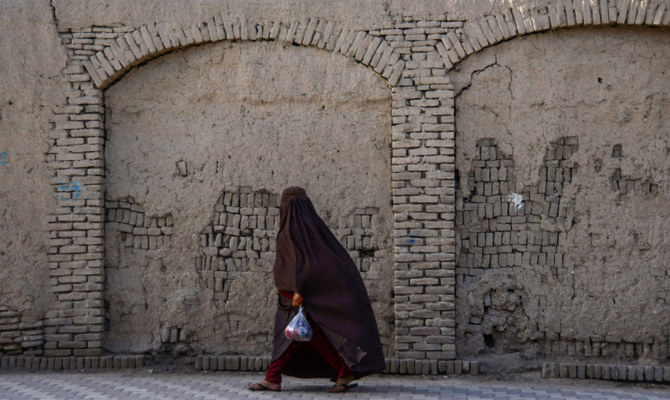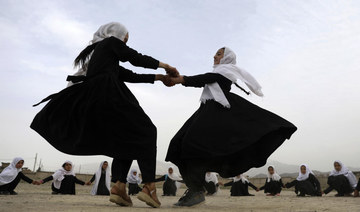UNITED NATIONS: A former member of Afghanistan’s parliament urged the world on Monday to label the Taliban a “gender apartheid” regime because of its crackdown on human rights, saying the apartheid label was a catalyst for change in South Africa and can be a catalyst for change in Afghanistan.
Naheed Farid, a women’s rights activist who was the youngest-ever politician elected to parliament in 2010, told a UN news conference that as a result of severe restrictions on women’s movements, an end to secondary-school education for girls, and ban on jobs for women, “I’m hearing more and more stories from Afghan women choosing to take their life out of hopelessness and despair.”
“This is the ultimate indicator on how bad the situation is for Afghan women and girls — that they are choosing death, and that this is preferred for them than living under the Taliban regime,” she said.
Farid, now at Princeton University’s School of Public and International Affairs, said she isn’t the first person to call the Taliban a “gender apartheid” regime but she said “the inaction of the international community and decision-makers at large makes it important for all of us to repeat this” so that the voices of women in Afghanistan who can’t speak out aren’t forgotten.
She expressed hope that world leaders meeting next week for their annual gathering at the UN General Assembly would make time to meet and listen to Afghan women living in exile, and start grasping that “gender apartheid” is happening in Afghanistan because women are being “used and misused,” relegated to subordinate levels of society, and stripped of their human rights by the Taliban.
When the Taliban first ruled Afghanistan from 1996 to 2001, women and girls were subject to overwhelming restrictions — no education, no participation in public life, and women were required to wear the all-encompassing burqa.
Following the Taliban ouster by US forces in 2001 after the 9/11 attacks in the United States, and for the next 20 years, Afghan girls were not only enrolled in school but universities, and many women became doctors, lawyers, judges, members of parliament and owners of businesses, traveling without face coverings.
After the Taliban overran the capital on Aug. 15, 2021 as US and NATO forces were in the final stages of their chaotic withdrawal from Afghanistan after 20 years, they promised a more moderate form of Islamic rule including allowing women to continue their education and work outside the home. They initially announced no dress code though they also vowed to impose Sharia, or Islamic law.
But Taliban hard-liners have since turned back the clock to their previous harsh rule, confirming the worst fears of rights activists and further complicating Taliban dealings with an already distrustful international community.
Farid accused the Taliban of using women as a “bargaining chip” to demand legitimacy, funds, and aid from the international community. She called this “very dangerous” because the full rights of Afghan women and girls must be a non-negotiable starting point for all negotiations with the Taliban.
Farid called on the Organization of Islamic Cooperation, comprising 57 Muslim nations, and other countries to create a platform for Afghan women to directly negotiate with the Taliban on women’s rights and human rights issues. She also urged countries to maintain sanctions on the Taliban, for all 183 Taliban leaders to be kept on the UN sanctions blacklist, for a ban on Taliban representatives at the United Nations, and for all delegations meeting with the Taliban to include women.
Norway’s UN Ambassador Mona Juul, whose country oversees Afghanistan issues in the UN Security Council and organized the press conference, said that a year after the Taliban takeover “the situation or women and girls has deteriorated at a shocking scale and speed.” As one example, she said Afghanistan is now the only nation in the world that forbids girls from education beyond the sixth grade.
Najiba Sanjar, a human right activist and feminist said she was speaking to convey the voices of 17 million Afghan girls and women who have no voice now.
“We are all watching the sufferings of women, girls and minorities from the screens of our TVs as if an action movie is going on,” she told reporters. “A true form of injustice is taking place right in front of our eyes. And we are all watching silently and partaking in this sin by staying complacent and accepting it as a new normal.”
She pointed to a recent survey of women inside Afghanistan that found that only 4 percent of women reported always having enough food to eat, a quarter of women saying their income had dropped to zero, family violence and femicide increasing, and 57 percent of Afghan women married before the age of 19. She also cited families selling their daughters and their possessions to buy food.
Sanjar urged the international community to put all possible pressure on the Taliban to protect the rights of women and minorities to education and work while withholding diplomatic recognition.
“Because women’s rights are human rights, what is happening is already alarming for all women in the world,” she said.
Former Afghan MP: Taliban is a ‘gender apartheid’ regime
https://arab.news/wzcv4
Former Afghan MP: Taliban is a ‘gender apartheid’ regime

- Farid called on the Organization of Islamic Cooperation, comprising 57 Muslim nations, and other countries to create a platform for Afghan women to directly negotiate with the Taliban on women’s rights and human rights issues
Belgium’s Ghent university severs ties with three Israeli institutions

Pro-Palestinian protesters in Ghent have been protesting against Israel’s military offensive in Gaza and have been occupying parts of the university since early this month.
The university’s rector, Rik Van de Walle, said in a statement that ties were being cut with Holon Institute of Technology, MIGAL Galilee Research Institute, and the Volcani Center, which carries out agricultural research.
“We currently assess these three partners as (very) problematic according to the Ghent University human rights test, in contrast to the positive evaluation we gave these partners at the start of our collaboration,” Van de Walle said.
Partnerships with MIGAL Galilee Research Institute and the Volcani Center “were no longer desirable” due to their affiliation with Israeli ministries, an investigation by the University of Ghent found, and collaboration with the Holon Institute “was problematic” because it provided material support to the army for actions in Gaza.
A spokesperson for the university said the move would affect four projects.
The three Israeli institutions did not immediately comment.
The protesters told Belgian broadcaster VRT they welcomed the decision but regarded it as only a first step. They said they would continue their occupation of parts of the university “until UGent breaks its ties with all Israeli institutions.”
The actions mirror those of students in the United States and elsewhere in Europe, calling for an immediate permanent ceasefire and for schools to cut financial ties with companies they say are profiting from what they regard as the oppression of Palestinians.
Muslim professionals quit ‘hostile’ France in silent brain drain

PARIS: After being knocked back at some 50 interviews for consulting jobs in France despite his ample qualifications, Muslim business school graduate Adam packed his bags and moved to a new life in Dubai.
“I feel much better here than in France,” the 32-year-old of North African descent told AFP.
“We’re all equal. You can have a boss who’s Indian, Arab or a French person,” he said.
“My religion is more accepted.”
Highly-qualified French citizens from Muslim backgrounds, often the children of immigrants, are leaving France in a quiet brain drain, seeking a new start abroad in cities like London, New York, Montreal or Dubai, according to a new study.
The authors of “France, you love it but you leave it”, published last month, said it was difficult to estimate exactly how many.
But they found that 71 percent of more than 1,000 people who responded to their survey circulated online had left in part because of racism and discrimination.
Adam, who asked that his surname not be used, told AFP his new job in the United Arab Emirates has given him fresh perspective.
In France “you need to work twice as hard when you come from certain minorities”, he said.
He said he was “extremely grateful” for his French education and missed his friends, family and the rich cultural life of the country where he grew up.
But he said he was glad to have quit its “Islamophobia” and “systemic racism” that meant he was stopped by police for no reason.
France has long been a country of immigration, including from its former colonies in North and West Africa.
But today the descendants of Muslim immigrants who came to France seeking a better future say they have been living in an increasingly hostile environment, especially after the attacks in Paris in 2015 that killed 130 people.
They say France’s particular form of secularism, which bans all religious symbols in public schools including headscarves and long robes, seems to disproportionately focus on the attire of Muslim women.
Another French Muslim, a 33-year-old tech employee of Moroccan descent, told AFP he and his pregnant wife were planning to emigrate to “a more peaceful society” in southeast Asia.
He said he would miss France’s “sublime” cuisine and the queues outside the bakeries.
But “we’re suffocating in France”, said the business school graduate with a five-figure monthly salary.
He described wanting to leave “this ambient gloom”, in which television news channels seem to target all Muslims as scapegoats.
The tech employee, who moved to Paris after growing up in its lower-income suburbs, said he has been living in the same block of flats for two years.
“But still they ask me what I’m doing inside my building,” he said.
“It’s so humiliating.”
“This constant humiliation is even more frustrating as I contribute very honestly to this society as someone with a high income who pays a lot of taxes,” he added.
A 1978 French law bans collecting data on a person’s race, ethnicity or religion, which makes it difficult to have broad statistics on discrimination.
But a young person “perceived as black or Arab” is 20 times more likely to face an identity check than the rest of the population, France’s rights ombudsman found in 2017.
The Observatory for Inequalities says that racism is on the decline in France, with 60 percent of French people declaring they are “not at all racist”.
But still, it adds, a job candidate with a French name has a 50 percent better chance of being called by an employer than one with a North African one.
A third professional, a 30-year-old Franco-Algerian with two masters degrees from top schools, told AFP he was leaving in June for a job in Dubai because France had become “complicated”.
The investment banker, the son of an Algerian cleaner who grew up within Paris, said he enjoyed his job, but he was starting to feel he had hit a “glass ceiling”
He also said he had felt French politics shift to the right in recent years.
“The atmosphere in France has really deteriorated,” he said, alluding to some pundits equating all people of his background to extremists or troublemakers from housing estates.
“Muslims are clearly second-class citizens,” he said.
Adam, the consultant, said more privileged French Muslims emigrating was just the “tiny visible part of the iceberg”.
“When we see France today, we’re broken,” he said.
North Korea fires ballistic missile, South Korea’s military says

- South Korea’s Joint Chiefs of Staff did not immediately provide details of the projectile or its trajectory
- North Korea has launched a range of ballistic and cruise missiles as well as tactical rockets in recent months
SEOUL: North Korea fired a ballistic missile toward the sea off its east coast, South Korea’s military said on Friday.
South Korea’s Joint Chiefs of Staff did not immediately provide details of the projectile or its trajectory.
North Korea has launched a range of ballistic and cruise missiles as well as tactical rockets in recent months, describing them as part of a program to upgrade its defensive capabilities.
Earlier on Friday, the powerful sister of North Korea leader Kim Jong Un said its tactical rockets were intended solely as a deterrent against South Korean military aggression, while denying that Pyongyang was exporting the weapons.
The missile launch comes at the same time as a visit by Russian President Vladimir Putin to the Chinese northeastern city of Harbin.
French police ‘neutralized’ armed person who tried to set fire to synagogue in Rouen — Darmanin

- The incident occurred early on Friday morning
PARIS: French police in Rouen shot dead an armed man who set fire to the city’s synagogue, Interior Minister Gerald Darmanin and local officials said on Friday.
The incident occurred in central Rouen, 130 kilometers northwest of Paris, early on Friday morning, Darmanin said in a post on social network X.
The attacker’s identity and motive were still unclear. He was carrying a knife and iron bar, according to local authorities.
France hosts the Olympic Summer Games in two months and recently raised its alert status to the highest level against a complex geopolitical backdrop in the Middle East and Europe’s eastern flank.
Elie Korchia, the president of France’s Consistoire Central Jewish worshippers body, said police had “avoided another anti-Semitic tragedy.”
Regional broadcaster France 3 said fire fighters were on the site. The fire had been brought under control, a Rouen city hall official said.
Rouen’s mayor said the Normandy town was ‘battered and shocked’.
The city in 2016 was rocked by an attack later claimed by the Islamic State, when a priest was killed with a knife during service in town of Saint-Étienne-du-Rouvray, in the southern part of Rouen’s urban agglomeration.
Suspected gunshots near Israeli embassy in Stockholm prompt police cordon

STOCKHOLM: Swedish police have detained several people and cordoned off an area in Stockholm after a patrol heard suspected gunshots, they said on Friday, with the Israeli embassy located in the closed-off area.
"A police patrol at Strandvagen in Stockholm heard bangs and suspected there had been a shooting," police said on their website, adding that the affected area lay between the capital's Djurgarden Bridge, its Nobel Park and the Oscar Church.
Several people have been detained and an investigation has been launched into a suspected serious weapons crime, they added.
"In connection with the ongoing forensic investigation, findings have been made that strengthen the suspicions that a shooting took place," police said on its website.
Reuters could not immediately reach police and the Israeli embassy for comment.
Swedish news agency TT said police declined to comment on whether there was a link between the incident and the Israeli embassy.




















